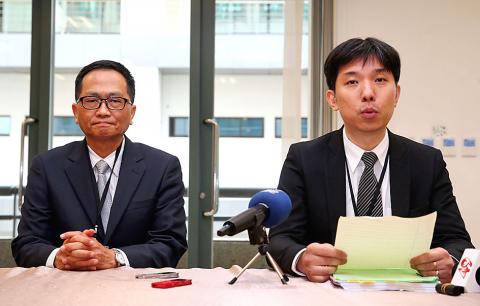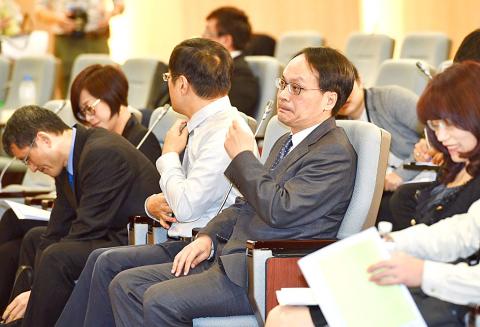The China Youth Corps yesterday denied an alleged connection with the Chinese Nationalist Party (KMT), saying at a hearing that the allegation was based on prejudice by the Ill-gotten Party Assets Settlement Committee.
The hearing was the second by the committee aimed at establishing whether the organization was controlled by the KMT or spun off from the party through questionable sales or transfers — conditions that could prompt the committee to recognize it as an organization founded with ill-gotten party assets.
The committee on Tuesday last week released a report suggesting that the corps has close links to the KMT, as the party had control over the organization’s personnel, finances and management, with former president Chiang Ching-kuo (蔣經國) directing it for 21 years before being succeeded by other KMT heavyweights.

Photo: CNA
The organization denied being affiliated with the KMT, saying it was a government agency before becoming an independent nonprofit foundation.
The corps was founded in 1955 as a government agency under the Ministry of National Defense, registered with the Ministry of the Interior as a “social movement organization” in 1970 and registered as an independent nonprofit organization in 1989, although KMT members were among its leaders, it said.
The committee has deliberately ignored organizational principles promulgated by the Executive Yuan in 1952 that were the legal foundation of the corps, and has instead cited the minutes of a 1952 KMT meeting in which a decision to create the organization was made, China Youth Corps lawyer Liu Chang-ping (劉昌坪) said.

Photo: Peter Lo, Taipei Times
“The committee has a predetermined position on this case, and its report listed only evidence unfavorable to the corps, suggesting its preconception,” Liu said.
The committee also hampered the organization’s efforts to prepare a defense, as the corps did not receive the report until Wednesday last week and did not finish reviewing more than 500 pages of appendices and evidence until Monday, he said, adding that the hearing should be invalid, as the organization was not given the legally required time to prepare.
Committee member Lien Li-jen (連立堅) said nearly 50 of the organization’s employees have been allowed to combine their years of work at the corps with time of government service to qualify for a public servant pension, a privilege awarded only to KMT employees.
Of all non-governmental organizations, the corps’ employees were the only ones given such a privilege, suggesting an unusual link with the KMT, Lien said.
The purpose of the organization is to assist the government, so its employees were considered de facto public servants, Liu said.
Corps research and development committee deputy director Cheng Fei-wen (鄭斐文) said no funds have been diverted to the KMT or any individual, adding that the foundation has no involvement in politics and should be excluded as an organization connected to ill-gotten party assets.
KMT Administration and Management Committee deputy director Lee Fu-hsuan (李福軒) said there is no evidence in the report indicating that the party had control over the corps, let alone a questionable spin-off.
The hearing was concluded without a final decision, but the assets committee is to determine whether further hearings are necessary.

AGING: As of last month, people aged 65 or older accounted for 20.06 percent of the total population and the number of couples who got married fell by 18,685 from 2024 Taiwan has surpassed South Korea as the country least willing to have children, with an annual crude birthrate of 4.62 per 1,000 people, Ministry of the Interior data showed yesterday. The nation was previously ranked the second-lowest country in terms of total fertility rate, or the average number of children a woman has in her lifetime. However, South Korea’s fertility rate began to recover from 2023, with total fertility rate rising from 0.72 and estimated to reach 0.82 to 0.85 by last year, and the crude birthrate projected at 6.7 per 1,000 people. Japan’s crude birthrate was projected to fall below six,

US President Donald Trump in an interview with the New York Times published on Thursday said that “it’s up to” Chinese President Xi Jinping (習近平) what China does on Taiwan, but that he would be “very unhappy” with a change in the “status quo.” “He [Xi] considers it to be a part of China, and that’s up to him what he’s going to be doing, but I’ve expressed to him that I would be very unhappy if he did that, and I don’t think he’ll do that. I hope he doesn’t do that,” Trump said. Trump made the comments in the context

SELF-DEFENSE: Tokyo has accelerated its spending goal and its defense minister said the nation needs to discuss whether it should develop nuclear-powered submarines China is ramping up objections to what it sees as Japan’s desire to acquire nuclear weapons, despite Tokyo’s longstanding renunciation of such arms, deepening another fissure in the two neighbors’ increasingly tense ties. In what appears to be a concerted effort, China’s foreign and defense ministries issued statements on Thursday condemning alleged remilitarism efforts by Tokyo. The remarks came as two of the country’s top think tanks jointly issued a 29-page report framing actions by “right-wing forces” in Japan as posing a “serious threat” to world peace. While that report did not define “right-wing forces,” the Chinese Ministry of Foreign Affairs was

PREPAREDNESS: Given the difficulty of importing ammunition during wartime, the Ministry of National Defense said it would prioritize ‘coproduction’ partnerships A newly formed unit of the Marine Corps tasked with land-based security operations has recently replaced its aging, domestically produced rifles with more advanced, US-made M4A1 rifles, a source said yesterday. The unnamed source familiar with the matter said the First Security Battalion of the Marine Corps’ Air Defense and Base Guard Group has replaced its older T65K2 rifles, which have been in service since the late 1980s, with the newly received M4A1s. The source did not say exactly when the upgrade took place or how many M4A1s were issued to the battalion. The confirmation came after Chinese-language media reported